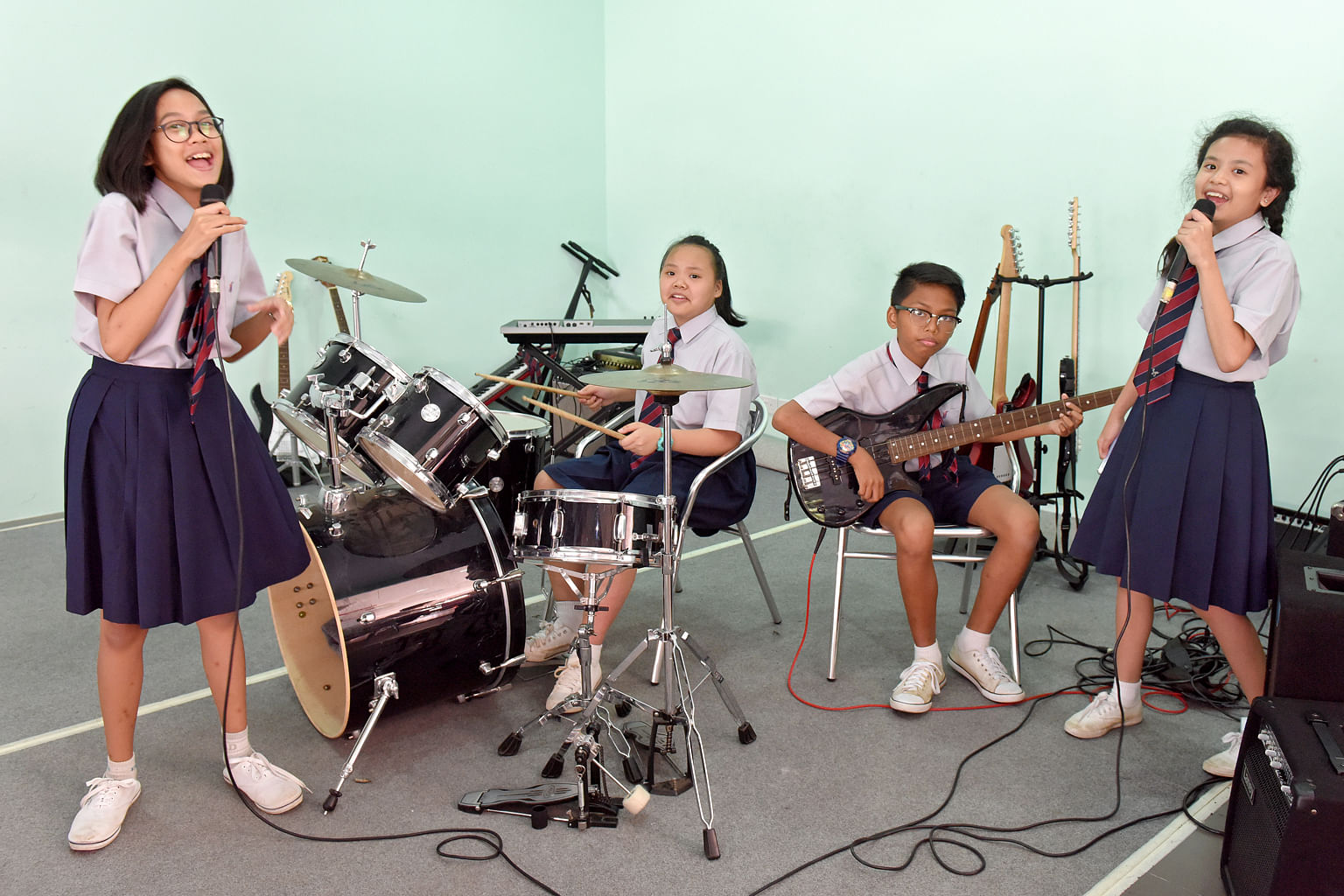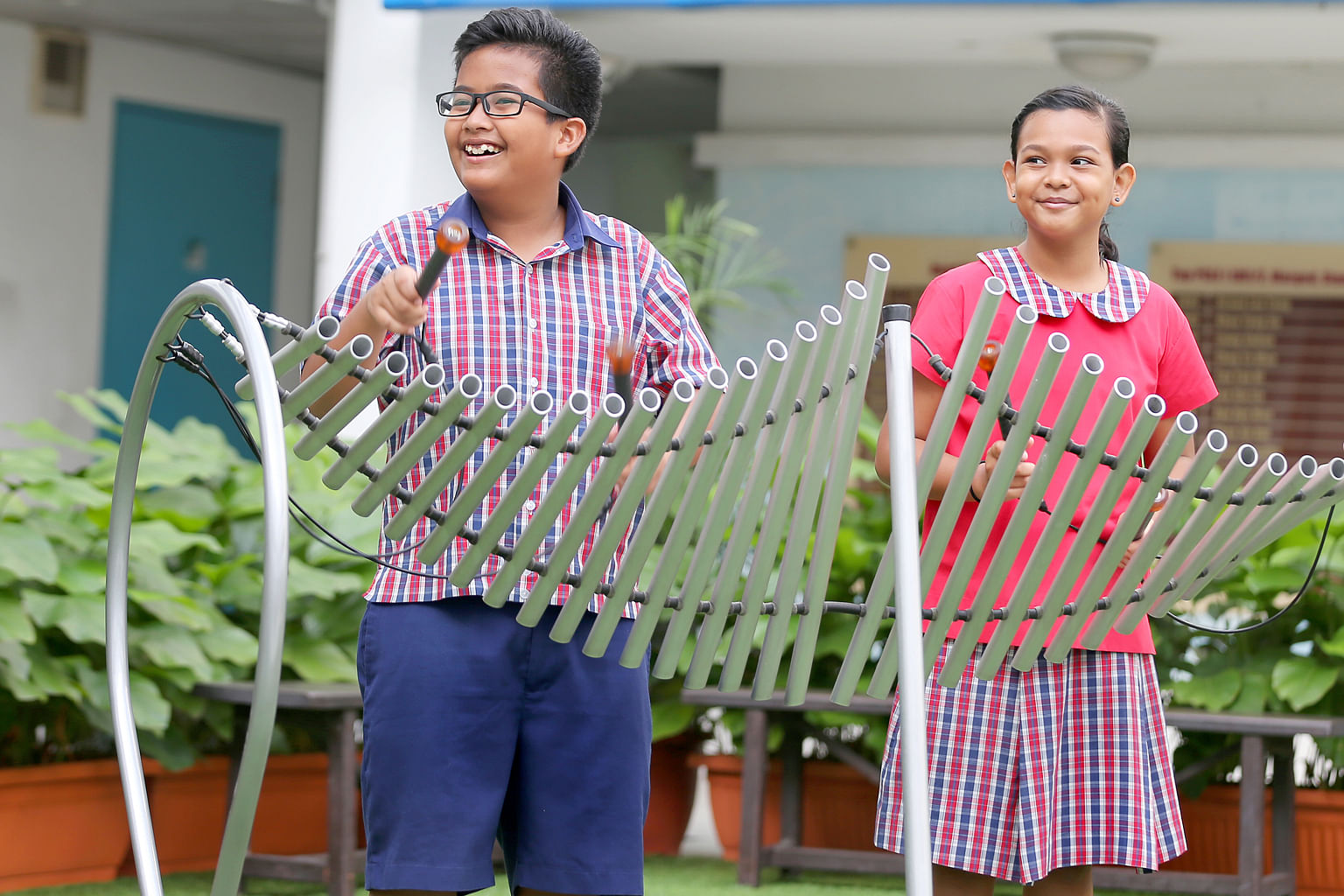Every space is a learning space
Schools are giving students places outside classrooms to encourage them to think, explore

A jamming room and an outdoor music garden have more in common than making tunes.
These are some of the informal learning spaces that some schools have been offering to students to get them to tinker in and explore in their spare time.
Some of these schools have benefited from various Ministry of Education (MOE) programmes that helped support the funding and construction of these flexible learning environments.
Junyuan Secondary School's Filtered Band Room, for instance, was introduced with the help of MOE's Flexible School Infrastructure programme.
Meanwhile, Yuhua Primary School's outdoor music garden and Westwood Primary School's eco-aquarium were created as part of the Outdoor Experiential Learning initiative.
The Straits Times takes a closer look at some of these spaces that encourage learning outside the classroom.
Eco-aquarium teaches pupils the value of life
At Westwood Primary School, an outdoor eco-aquarium has become a theatre for "dramatic" encounters between aquatic animals - grabbing the attention of pupils there.
When The Straits Times visited the eco-aquarium located beside the canteen during recess two weeks ago, a few Primary 5 pupils were gesturing at an injured puffer fish, the casualty of a crayfish "attack". Said Primary 5 pupil Isaiah Ong, 11: "It's big fish eats small fish. In the sea, you need to know your place in the food chain."
The eco-aquarium, which was launched in 2015 in the Jurong West school, has been a place for pupils to learn more about ecology.
It features a main freshwater pool, connected by a system of pipes to a central island with plants as well as a wetlands pool. The eco-aquarium has eight stable freshwater animal species and 10 stable plant species.
Among the animals there are the green spotted puffer, banded mountain loach and guppies. Their excrement is filtered from the water and transferred to the soil in the central island as fertiliser.
Primary 5 pupil Ong Zhi Xuan, 11, said: "I learnt about the life cycle of fish. It's like a small ocean. There are lots of interesting events you can see, like the pufferfish incident, and the bullfrog incident."
Last year, bullfrog tadpoles escaped from the wetlands pool via a pipe connecting it to the main pool - where they grew into carnivorous bullfrogs and started eating fish.
Science and maths teacher Jennifer Long, 45, who helped conceptualise the gardens, was surprised by how observant the children were. Acting on their interest, she started teaching them about predator-prey relationships earlier than planned.
"It was a teachable moment - they learnt about the value of life, food chains, and we went on to talk about the role of different creatures in the environment," she said.
When pupils started questioning why pufferfish poison would not work on the crayfish, this led to a discussion about fugu chefs.
Said Madam Long: "The children talk about the value of life, about their role in the environment. A lot of learning takes place off-campus, but what we provide is the trigger. They think about what they saw, and ask, 'why is this happening?'."
Toh Wen Li

A place to make music and build friendships
Nearly every Friday after school, Junyuan Secondary School classmates Muhammad Nurafiq Muhammad Tiswal, Ellie Low, Alifah Abdul Halid and Eunice Pajarillo, all 13, make a beeline for a Jamming Studio in their canteen.
Ellie heads straight for the drums, Nurafiq picks up the electric guitar, and Alifah and Eunice grab microphones and start singing.
The self-professed "music squad" often spends a good three hours performing covers of popular songs by singers like Shawn Mendes and Ed Sheeran, jazzing them up with improvisations and spontaneous key and lyric changes.
"We usually play a trendy song, then all of a sudden, it changes into a different kind of song... It becomes our own music," said Alifah.
Ellie, who had never played the drums before this, said: "It's better than going out. Some people just go to the playground or to shopping malls. If they came here, they could actually learn a new skill."
The Jamming Studio at the school in Tampines was originally set up in 2013 as the Filtered Band Room - a space to help students quit smoking by venting their emotions through rock music.
It is now open to all students who want to make music. The 27 sq m room, which cost about $12,000, is equipped with electric guitars, keyboards, a drum set and microphones.
Students have to book it in advance. It is air-conditioned and the walls are made of transparent glass so others can look in and feel encouraged to use the room too.
Just outside the room in the canteen is a Yamaha piano that students like Alifah - who taught herself to play the piano when she was younger - enjoy tinkering with.
Student management department head Denise Tan, 36, said: "Kids nowadays don't usually head home straight after school, so they need something after school that's aligned with their interests. That's a safe environment they can go to if they want to spend time with their friends, to build relationships."
Toh Wen Li

Pupils express their feelings in Yuhua Primary's music garden
Minutes after the recess bell rings in Yuhua Primary School, pupils start exploring an outdoor music garden in a courtyard next to the canteen.
The Jurong East school's music garden, funded by the Ministry of Education and opened in April last year, features eight different outdoor percussion instruments imported from the United States.
These range from a row of vertical metal poles called the Contrabass Chimes, to drums and the Flying Armadinda, a set of suspended wooden blocks.
One of the pupils in the garden a fortnight ago, seven-year-old Faith Tan, told me as she tinkered on the Swirl chimes that she found their sound "soft and beautiful".
Too busy hammering away at the instrument to pay me any more attention, she turned back to the boy next to her, asking him: "What rhythm is better? I'll try this one..."
Said department head for aesthetics and discipline Musa Abdul Kadir: "It doesn't matter which note you hit. Even the 'wrong' note will harmonise."
He added: "They come in just to explore... Before you know it, they are playing their own music."
Primary 6 pupil Nur Aqilah Jumadi, 11, who was homeless until the age of four, has long found solace in music.
"I've been through a lot. I express my feelings through song, and sometimes I feel music is my best friend."
She sees the outdoor music garden as a place to make new friends and inspire her to compose her own music. About a month ago, she represented her school in theSYF 2017 Theme Song Writing Contest for the Singapore Youth Festival by submitting an original composition.
Her friend Muhammad Danial Khairudin, 12, who spends about an hour at the music garden after school every day, said: "I express my anger through music. We can combine the music to play a harmonious sound. Once I play music, I feel happier."
Toh Wen Li
WATCH THE VIDEO
The outdoor music garden at Yuhua Primary School. http://str.sg/4nvi

Piano in school strikes right note with students
Last year, Pongphon Top Sihathep saw fellow Mayflower Secondary School student Erika Fam playing on a piano in the school concourse.
Enthralled, he sidled up to her with a simple question: "Can I try?"
He told The Straits Times: "I had no idea how to play."
Pongphon, 14, who has never taken formal piano lessons, ended up returning to the piano every day after school to tinkle the ivories. He and Erika, who are both in the choir, soon became firm friends.
In the space of a year, he taught himself to play the piano by learning to read music, watching YouTube tutorials and observing student pianists like Erika in action. "She told me to sit at the edge of the bench and taught me how to curve my fingers properly," he said.
Erika, 14, added: "He would spend the entire time on WhatsApp asking me about a piece."
The Yamaha piano is located next to a concrete platform where students hang out or rehearse dance moves. Lunchtime concerts are also held there twice a year.
Erika, who has a Grade 8 in piano, and recently sat an exam for a diploma, said that whenever she plays anime songs, such as Joe Hisaishi's melodies from Spirited Away, people start to gather round - and some end up becoming friends.
She said: "We come here almost every day. This place is a sanctuary to us. We share music and play duets with strangers. Students sometimes do a 'piano battle' to see who can play better."
Pongphon enjoys playing songs from game and movie soundtracks. At the moment, he is teaching himself City Of Stars from the popular Hollywood musical La La Land.
"It's very impressive," Erika said of Pongphon's ability to pick up the instrument in such a short space of time.
Toh Wen Li
Join ST's WhatsApp Channel and get the latest news and must-reads.
A version of this article appeared in the print edition of The Straits Times on March 06, 2017, with the headline Every space is a learning space. Subscribe

